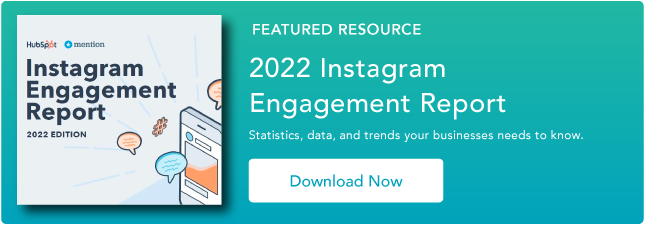Instagram likes to keep marketers on their toes. Just this past year, we’ve seen a speedy roll out of new features, an expansion into video, and a plethora of new shopping options.
But it’s not only the platform that’s evolving — the audience is too. Now it’s up to marketers to evolve their Instagram strategy to better align with audience preferences, behaviors, and habits in 2022.
Here, we’ll cover five main challenges marketers are facing on Instagram and the best strategies to solve them.
5 Instagram Challenges Marketers Face
1. Knowing which hashtags to use – and how many.
From the platform that gave us #ThrowbackThursday and #WednesdayWisdom, it’s no surprise that hashtags play a huge role on Instagram. But they can also be difficult to crack — how many should you use? Should you stick with the popular hashtags or target more niche ones?
HubSpot and Mention’s 2022 Instagram Engagement Report answers some of these questions.
For one, while it may sound counterintuitive to avoid popular hashtags (like #travel or #photography), it’s better to lean into niche communities. The reason? Even though niche hashtags have fewer posts, they typically have a more dedicated community following them.
In fact, the report found that hashtags targeting specific interests and communities — like geographic locations and TV shows — garnered the most engagement.
When it comes to the number of hashtags you include your post, one thing is clear — the more the better. The report finds that using many hashtags doesn’t seem to harm post performance. But a word of caution here — always keep your hashtags relevant to your niche. Otherwise, you may reach the wrong audience in an effort to increase engagement.
2. Securing budget for Influencer Marketing.
For many marketers, influencer marketing seems out-of-reach — after all, don’t you have to spend big bucks to partner with mega influencers? Think again.
While it seems like a best practice to partner with influencers with tons of followers, HubSpot’s Instagram Engagement Report says your efforts are more worthwhile if you partner with influencers that may have fewer followers but a more engaged community (known as micro influencers). Another study even found that the fewer followers an influencer has, the better their engagement rates tend to be.
Micro influencers provide smaller, highly-engaged audiences without the hefty price tag of a mainstream celebrity — making this type of marketing more accessible to a variety of brands.
With 97% of marketers planning to increase their investment in influencer marketing on Instagram this year, now is a great time to give it a try.
3. Posting at the right times.
Timing is a detail easy to overlook in your marketing strategy. But with social media algorithms favoring recent content, it’s more important than ever to target the right people at the right time.
The HubSpot’s Instagram Engagement Report offers some clear insights on timing your posts right:
- Content posted between 6 PM and 9 PM generate the most engagement
- Mornings from 5 AM to 12 PM offer the lowest engagement rate
- From Monday to Friday, the engagement rate stays about the same, but the weekend holds a slight edge.
While these stats give a general picture of when to post — this doesn’t mean these times will work for you or your audience. It’s important to explore where your audience is located and when they’re most active.
You should also consider if your content lends itself to a certain time of day. For instance, a coffee shop might prefer to post in the morning or during the afternoon work slump.
No two audiences are the same. Ultimately, you should test different days and times and see which posts perform the best with your unique audience.
4. Writing compelling captions.
There’s a lot of pressure when writing Instagram captions — it has to be compelling and memorable — and less sales-y and boring.
The first mistake you can make is skipping the caption entirely. According to the report, including a caption gives you a significant boost in engagement, from just under 4% to over 6%.
When the time comes to write a caption, the most important “rule” is to lead with your brand voice. If you need to create one, start by noting a few adjectives that describe your brand, then use them to craft relevant captions.
For example, the brand Nike is known for messages of inspiration and motivation — whereas the brand Lego is known for being fun and creative, just like their captions on Instagram.
Check out this video for more advice on writing great captions:
5. Knowing what content your audience wants.
If you’re on Instagram, you might assume images are the most engaging type of content on the platform.
As it turns out, video is king — bringing an average of 24 comments and 1,097 likes per post, according to the HubSpot’s report. Other research shows videos are more “sticky” and shareable.
Following closely behind is carousel posts. As a refresher, these are posts that contain multiple types of media (image or video) that users can scroll through. They offer more interactiveness than static posts because the user has to scroll through the content.
The trend is clear — great marketing in 2022 must go beyond photos. Start by looking at your current strategy and identifying opportunities to incorporate carousels and play around with video formats like Reels and Stories.
Final Thoughts
Instagram is constantly evolving, along with the audience on it. Knowing when — and how — your audience interacts with the platform is crucial for aligning your content and generating more engagement. Start with the tips in this blog and always test your strategies regularly.
![]()

![New Data: Instagram Engagement Report [2022 Version]](https://i4lead.com/wp-content/uploads/2022/04/9294dd33-9827-4b39-8fc2-b7fbece7fdb9.png)
